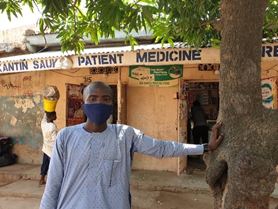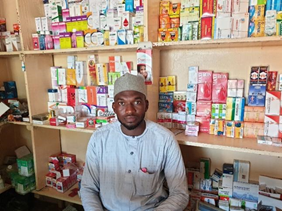SHOPS Plus Nigeria is increasing the availability of and access to TB services in the private sector by establishing private provider networks made up of different cadres to detect, diagnose, and successfully treat TB. These networks include clinicians, patent proprietary medicine vendors (PPMVs), community pharmacists (CPs), and labs.
SHOPS Plus trains all members of the networks and encourages them to conduct routine TB screening, take sputum samples from presumptive TB patients, and refer presumptive TB patients to a clinical facility in the network. The original concept for the model, which was piloted in India, is that the private provider networks follow a hub-and-spoke model – with clinical health facilities acting as referral hubs and PPMVs, CPs, and laboratories serving as the referring spokes.
In Nigeria, the SHOPS Plus project has supported local intermediary organizations and used ongoing data analysis to optimize the composition of private TB diagnostic and treatment networks. In the first half of 2020 in Kano State, the project facilitated 1,696 notifications from private facilities, which represented 21 percent of 8,055 total TB case notification in the state (up from 14 percent in 2019) and almost 100 percent of the state’s total (1,702) private sector notifications. The corresponding figures for SHOPS Plus in Lagos State were 1,184 TB case notifications from private facilities in This represented 26 percent of the 4,629 total TB case notifications in the state (up from 22 percent in 2019), and was equivalent to 93 percent of the 1,278 total private sector notifications in the state.
This success was possible in part because of quick adaptation to the COVID-19 situation in the country. In March 2020, as COVID-19 started to spread in Nigeria, the SHOPS Plus Program implemented a series of interventions designed to mitigate the impact of the pandemic and its resulting lockdown. One of these interventions was the redistribution of ad-hoc screeners to facilities close to where they lived, so that screening support would be sustained in the event of a lockdown causing movement restrictions.
As anticipated, the government of Kano State imposed a lockdown to prevent the spread of COVID-19 in April 2020. While the lockdown caused a reduction in hospital attendance, client patronage in the informal private sector, mainly in patent medicine stores, increased. Noting this change, the program immediately adapted the screeners’ placement so that ad-hoc screeners that were assigned to clinical facilities where attendance was declining were converted to “roaming screeners.” The screeners screen clients for TB at PPMVs during their busiest hours.
Zayyanu is one of 15 SHOPS Plus-trained screeners in Kano State who were converted to become “roaming screeners” at this time. Because they were assigned to screen clients at PPMVs in their own communities, their movements were not restricted by the lockdowns. Screeners like Zayyanu can support multiple PPMVs and maximize their impact each day, as the stores often have varying peak hours, when client loads are at their highest.
Zayyanu identified his first TB case in May 2020 while screening walk-in clients at Kandi Sauki PPMV. In June 2020, he identified three TB cases. He now supports six PPMVs. Two of them have high client loads at night, so he visits them during evening hours. The PPMVs are elated with the help they receive from the screeners. Tariq, the manager of one of the patent medicine stores, said he was first engaged by SHOPS Plus in 2018, but found his first TB case only when Zayyanu started supporting him this year.


